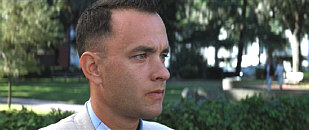 Some movies can easily be examined on their own merits, and others become too wrapped up in other factors to be viewed without bias. Into the latter category falls Forrest Gump, the enormously successful 1994 film that eventually turned into a litmus test for one’s cinematic allegiances.
Some movies can easily be examined on their own merits, and others become too wrapped up in other factors to be viewed without bias. Into the latter category falls Forrest Gump, the enormously successful 1994 film that eventually turned into a litmus test for one’s cinematic allegiances.
As I’ve noted in many others reviews, I’ve often disagreed with the Oscar selections for Best Picture, but rarely has a year seemed quite as distinctive. 1994 was chock full of solid nominations, as almost any of the five films easily could have warranted the prize; Quiz Show and The Shawshank Redemption were fine films, while only Four Weddings and a Funeral seemed out of place. However, few gave any of those three much of a shot, as it seemed clear that the battle would occur between Gump and Quentin Tarantino’s Pulp Fiction.
Though the latter didn’t approach Gump’s box office success, it was an astonishing success in its own right. Although Gump grabbed $329 million - which currently puts it at sixth on the all-time chart - Pulp’s $107 million is nearly as astonishing given the nature of the two movies. Gump is unusual in that it lacks the “big” qualities we generally associate with blockbusters, but its kind, gentle spirit made it accessible to all audiences. Pulp, on the other hand, was distinctly adult, and also much nastier; few were likely to take grandma and the kids to see this profane, violent work.
It also seemed much fresher, as Tarantino seemed to be creating a whole new style of neo-noir. Gump may have been entertaining and warm, but it didn’t offer anything particularly scintillating or innovative. Gump felt like cinematic status quo, while Pulp was an exciting look at future possibilities.
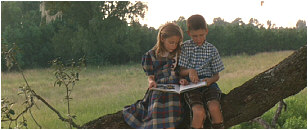 As such, the fight between the two was largely drawn along generational lines. Those distinctions seemed less related to the age of the viewer than to their expectations for film. It also created an opportunity for the Academy to move ahead and pick the less safe - but more rewarding - choice.
As such, the fight between the two was largely drawn along generational lines. Those distinctions seemed less related to the age of the viewer than to their expectations for film. It also created an opportunity for the Academy to move ahead and pick the less safe - but more rewarding - choice.
Of course, they didn’t do this. While a victory for Pulp would have rewarded daring filmmaking, the almost inevitable win for Gump meant support for more of the same. Not that I feel Gump is an ordinary film, for it’s actually quite well made. However, it doesn’t do much to take the format forward, and it was about as safe a film as one could find.
Even before the Oscar controversy, I found it hard to view Gump on its own merits. The film’s pre-release trailers immediately turned me off, as the made the movie look like a sappy piece of pandering tripe. However, when I read reviews, I started to feel differently, as most of these indicated Gump offered more than I initially expected.
Back in those days, I almost never saw films during their initial theatrical runs. I had a number of bargain theaters close to home, so I usually waited for movies to make it there. As such, I was always behind the times cinematically, and since Gump did so well, this meant that I wouldn’t be able to check out the flick until it’d been around for many months.
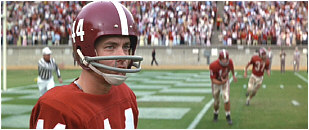 In retrospect, this was unfortunate, since it resulted in a second backlash on my part. The film truly took the nation by storm, and its popularity made it almost unbearable. Much of the hype was combined with a conservative rush to embrace its “family values” - this was the year of the great “Republican revolution” that claimed many new seats in the Senate and the House - and the roar became deafening. All of this seemed ironic, since many of those who so strongly embraced the flick promoted politics quite different from those of its creators, but the Gump onslaught got really annoying for those of us who weren’t under its spell.
In retrospect, this was unfortunate, since it resulted in a second backlash on my part. The film truly took the nation by storm, and its popularity made it almost unbearable. Much of the hype was combined with a conservative rush to embrace its “family values” - this was the year of the great “Republican revolution” that claimed many new seats in the Senate and the House - and the roar became deafening. All of this seemed ironic, since many of those who so strongly embraced the flick promoted politics quite different from those of its creators, but the Gump onslaught got really annoying for those of us who weren’t under its spell.
As such, it became almost impossible for me to consider the movie on its own merits when I finally did see it. However, I tried to do so, and I think I generally succeeded. My thoughts in 1994 remain virtually identical to those I experienced when I watched the film again on DVD. Gump is an entertaining and fun trifle that has many winning qualities but that fails to do anything particularly special.
Gump features no true plot, as it simply recounts the self-told life story of the titular protagonist, played by Tom Hanks. We see Forrest grow from a boy (portrayed by Michael Conner Humphreys) who was plagued by a variety of concerns. He had to wear leg braces to straighten his back, and he lacked much in the way of mental faculties; the latter almost forced him to go to a special school. However, his mother (Sally Field) was determined to have him be treated like everybody else, and her support helped Forrest make it through the years.
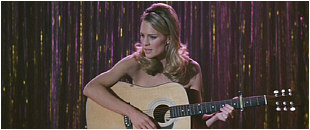 Eventually Forrest went to college on a football scholarship, and after that, we went into the Army. While in that position, he fought in Vietnam - where he earned a Medal of Honor for bravery - and also played ping-pong in communist China. After that he captained a shrimping boat, which made him buckets of money, and became famous again for multiple running treks across the US. Along the way, he encountered boohoogles of famous folks, such as three presidents and John Lennon.
Eventually Forrest went to college on a football scholarship, and after that, we went into the Army. While in that position, he fought in Vietnam - where he earned a Medal of Honor for bravery - and also played ping-pong in communist China. After that he captained a shrimping boat, which made him buckets of money, and became famous again for multiple running treks across the US. Along the way, he encountered boohoogles of famous folks, such as three presidents and John Lennon.
However, the many narrative of Gump addressed his semi-unrequited love for childhood friend Jenny (played by Hanna R. Hall as a kid and Robin Wright as an adult). While Forrest felt content to go along with the status quo and do what he was told, Jenny was much more restless, and her inner unhappiness carried her through many traumatic events. In the Army, Forrest also befriended shrimp-obsessed Bubba Blue (Mykelti Williamson), a guy only a few points smarter than Forrest, which made him the more dominant of the pair by a small margin. He also got to know Lieutenant Dan Taylor (Gary Sinise), their commanding officer in Vietnam. Their paths crossed many times after the war as well.
Gump alternates between semi-mushy and sentimental fare and more comedic material. The former tone gets most of the attention, but I think many miss the point. To a degree, a lot of folks have vilified Gump for its apparently reactionary tone, and the complaints are understandable. Forrest is dumber than dirt, and almost nothing seems to affect him; his few displays of emotion almost always relate to Jenny. However, he skates through life without many scratches, and he becomes terrifically successful along the way. On the other hand, smarter and more ambitious people like Jenny and Dan spend most of the film in a state of unhappiness.
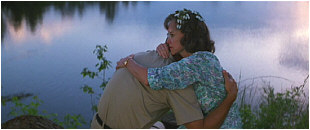 Does this theme mean that the filmmakers endorse a lack of drive and attempts to grow? I don’t think so. For one, interpretations of Gump’s tone often go down the wrong path. Much of the film creates a satirical fantasy. It’s often clear that we’re not really supposed to believe what we see. Forrest’s story should not be taken literally, for although it’s portrayed as “real”, the absurdities make it become far too silly and unbelievable to really accept. Honestly, I think much of the movie means to mock the kind of true-hearted and steadfast character represented by Forrest; he achieves so much so easily that it becomes difficult to see the story as anything other than a parody of those sorts of tales.
Does this theme mean that the filmmakers endorse a lack of drive and attempts to grow? I don’t think so. For one, interpretations of Gump’s tone often go down the wrong path. Much of the film creates a satirical fantasy. It’s often clear that we’re not really supposed to believe what we see. Forrest’s story should not be taken literally, for although it’s portrayed as “real”, the absurdities make it become far too silly and unbelievable to really accept. Honestly, I think much of the movie means to mock the kind of true-hearted and steadfast character represented by Forrest; he achieves so much so easily that it becomes difficult to see the story as anything other than a parody of those sorts of tales.
On the other hand, I do think that Gump espouses some values, but I disagree that they’re as regressive as they may appear. As a character, Forrest doesn’t represent the triumph of the idiots. While he certainly is a dope, I feel that he prospers due to his convictions more than just dumb luck. To be certain, the latter appears to be the point much of the time, as Forrest stumbles through history and success. However, I think the movie promotes the concept that you should do what you believe to be right and not waver from a commitment to behave nobly and appropriately at all times.
Forrest’s IQ complicates matters, for his denseness does make it appear that the only way to succeed is to remain blithely unaware of negativity. That doesn’t remain the case, however, for we do see happiness in smarter folks once they accept the appropriate path. Too many of them fight against what they know to be right, and only when they do the right thing are they able to find contentment. Forrest isn’t depicted as an ideal, but he’s used as the proverbial blank slate against which we can compare ourselves.
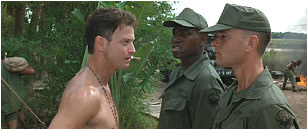 Probably the biggest problem I have with Gump relates to its mildly schizophrenic nature. At times director Robert Zemeckis can’t seem to decide if he wants to favor the satirical comedy or the more introspective and emotional sides. Personally, I think the former work best, as I preferred the funny bits. Gump’s forays into topics of depth didn’t always succeed, and the movie played best as a gleeful farce.
Probably the biggest problem I have with Gump relates to its mildly schizophrenic nature. At times director Robert Zemeckis can’t seem to decide if he wants to favor the satirical comedy or the more introspective and emotional sides. Personally, I think the former work best, as I preferred the funny bits. Gump’s forays into topics of depth didn’t always succeed, and the movie played best as a gleeful farce.
Nonetheless, I do think that the movie functions well as a whole. I remain unconvinced that it merited the level of success it achieved. Pulp still looks like the much superior film, and while I really like Tom Hanks, I don’t think he deserved an Oscar for his work as Forrest. To be sure, he did a nice job in the role. Unlike Dustin Hoffman’s one-note performance in Rain Man, Hanks brings an appropriate level of depth to the character. He makes Forrest dense enough to have us accept his stupidity, but he avoids creating a cartoon moron. At times Hanks’ innate intelligence comes through and breaks the role to a degree, but these examples were rare, as he usually stays in the part successfully.
My objection to his victory relates to the scope of the part. Hanks throws himself into Forrest with gusto and shows a commitment to the character others would lack; he never winks to the audience or lets them in on the gag. However, Forrest is such a limited part that I don’t think anyone merits an Oscar for him. The role remains so inherently free of complexity that the job becomes much easier than it otherwise might be. To be certain, Hanks is generally excellent as Forrest, but it isn’t an award-worthy role.
 The supporting cast members all prosper as well, though not perfectly, as they occasionally come across as one-note themselves. Wright’s Jenny is probably the biggest victim of this trend. Frankly, she makes it hard for us to understand why Forrest loves her so much. Sure, she’s lovely, and part of the problem relates to the script, which forces Jenny to abandon Forrest multiple times. Wright lets us see the broken side of Jenny but we rarely witness much else. She plays up the abused girl aspect of the role and doesn’t give us much in addition to that. It’s still a nice performance, but it would have benefited from additional depth.
The supporting cast members all prosper as well, though not perfectly, as they occasionally come across as one-note themselves. Wright’s Jenny is probably the biggest victim of this trend. Frankly, she makes it hard for us to understand why Forrest loves her so much. Sure, she’s lovely, and part of the problem relates to the script, which forces Jenny to abandon Forrest multiple times. Wright lets us see the broken side of Jenny but we rarely witness much else. She plays up the abused girl aspect of the role and doesn’t give us much in addition to that. It’s still a nice performance, but it would have benefited from additional depth.
The same goes for Sinise as Dan. He mostly comes across as someone mad at the world, and we don’t really understand the reasons for his anger. Sure, there are some discussions of his “destiny”, but the film doesn’t back these up with enough exposition. Instead, it treats his “destiny” in a jokey fashion that makes it hard for us to accept his bitterness when his desired fate doesn’t occur. Sinise brings his usual prominence to the role, but as with Jenny, it’s underwritten and somewhat unsatisfying.
At the time of its theatrical release, Gump received a lot of attention for its visual effects. Ala Woody Allen’s Zelig, the film often placed Forrest in historical situations, though it one-upped the older movie; while Allen’s flick simply put the character in static places, Gump showed Forrest as he interacted with famous folks.
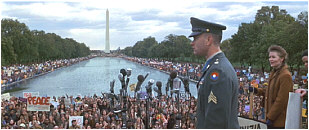 This all seemed pretty convincing seven years ago, but those effects haven’t aged well. The shots in which we see the notables speak worked especially poorly. The mouth movements didn’t match the words terribly well, and the effects make the scenes come across in a very jarring way. They’d disrupt the flow of the story in any case, as the audience will always be startled to see history and fiction mesh in this manner. When the effects don’t function well, however, the problem becomes exacerbated. Most of the film’s visual elements were integrated cleanly; as with Zemeckis’ 2000 hit, Cast Away, Gump featured a slew of shots that utilized effects in pedestrian, non-showy ways, and those remained solid. However, the more gimmicky shots became a definite distraction, and they could take the viewer out of the story.
This all seemed pretty convincing seven years ago, but those effects haven’t aged well. The shots in which we see the notables speak worked especially poorly. The mouth movements didn’t match the words terribly well, and the effects make the scenes come across in a very jarring way. They’d disrupt the flow of the story in any case, as the audience will always be startled to see history and fiction mesh in this manner. When the effects don’t function well, however, the problem becomes exacerbated. Most of the film’s visual elements were integrated cleanly; as with Zemeckis’ 2000 hit, Cast Away, Gump featured a slew of shots that utilized effects in pedestrian, non-showy ways, and those remained solid. However, the more gimmicky shots became a definite distraction, and they could take the viewer out of the story.
Seven years after it dominated multiplexes, I remain of two minds about Forrest Gump. On one hand, I still don’t understand its enormous success, both financially and at awards ceremonies; it was a pleasant and entertaining movie, but it wasn’t anything remarkable. On the other hand, I really do enjoy Gump as a film, at least for most of its running time. The movie makes some missteps along the way, but for the most part, it provides a witty and endearing program. I don’t feel that Forrest Gump is a classic, but it offers a fun and winning experience for the most part.
The DVD:
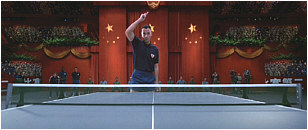 Forrest Gump appears in an aspect ratio of approximately 2.35:1 on this single-sided, dual-layered DVD; the image has been enhanced for 16X9 televisions. For most of the film, Gump looked very strong, but a few concerns marred the presentation at times.
Forrest Gump appears in an aspect ratio of approximately 2.35:1 on this single-sided, dual-layered DVD; the image has been enhanced for 16X9 televisions. For most of the film, Gump looked very strong, but a few concerns marred the presentation at times.
Sharpness consistently appeared strong, as most of the movie seemed to be crisp and detailed. A few interiors looked slightly soft and fuzzy, but these were rare, and the film usually came across as distinct and accurate. However, some moiré effects cropped up along the way, and edge enhancement was a definite problem at times; starting with the opening credits, images occasionally betrayed an annoying halo.
Print flaws also seemed to be somewhat excessive. The movie occasionally betrayed light grain, grit and a few nicks. These weren’t extreme, but they did appear too heavy for a recent film, especially one with such a high profile.
Colors looked nicely natural and well saturated. The movie featured a lifelike palette, and the DVD made these tones appear clean and vibrant at all times. I saw no problems related to bleeding, noise, or other concerns, as the colors remained consistently vivid and distinct. Black levels also came across as nicely rich and deep, and except for some mildly murky interiors - such as in Jenny’s dorm room - shadow detail appeared appropriately opaque without any excessive thickness. Much of Forrest Gump presented a very strong image, but some edge enhancement and a few other concerns knocked my overall grade down to a “B”.
 Somewhat stronger was the Dolby Digital 5.1 soundtrack of Forrest Gump. The soundfield presented an interesting affair due to its frequently subdued nature. Throughout much of Gump, the mix remained very firmly anchored to the forward channels, and even there it appeared fairly quiet. In addition to the nice stereo reproduction of Alan Silvestri’s score and the many rock tunes we heard, the track focused largely upon general ambience. In that vein, Gump created a gentle but convincing atmosphere.
Somewhat stronger was the Dolby Digital 5.1 soundtrack of Forrest Gump. The soundfield presented an interesting affair due to its frequently subdued nature. Throughout much of Gump, the mix remained very firmly anchored to the forward channels, and even there it appeared fairly quiet. In addition to the nice stereo reproduction of Alan Silvestri’s score and the many rock tunes we heard, the track focused largely upon general ambience. In that vein, Gump created a gentle but convincing atmosphere.
During a few scenes, however, the soundfield came more forcefully to life. Some solid environmental effects cropped up during the football games, and a few other segments offered light surround elements. The real showstoppers were the shots in Vietnam, though, which kicked the mix to life in a very loud and active way. I’ve read some criticisms of this technique that felt the shift was too jarring. Well, duh! Since the film was told from Forrest’s point of view, it should blast the audience with the same impact he would have felt. As such, the change of pace was absolutely appropriate, and it helped make parts of the soundtrack much more involving and active.
Audio quality appeared to be solid. Dialogue sounded warm and natural, and I discerned no concerns related to intelligibility or edginess. Effects were crisp and accurate, and even during the loud scenes, they showed no signs of distortion. Music also seemed clear and bright. Some of the period rock tunes displayed a little crackling, but this appeared to relate to the original recordings, not the DVD’s soundtrack. Dynamic range seemed to be good but not exceptional. While highs sounded clean and distinct, I thought that bass response was merely decent; low-end could have packed a more powerful punch. Ultimately, Forrest Gump provided a fairly strong soundtrack, though not one that presented a consistently exciting package.
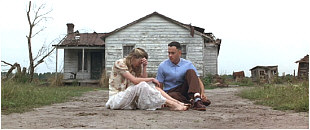 Forrest Gump represents Paramount’s first two-disc special edition; while The Ten Commandments required a second platter due to the length of the movie, it included almost no supplements. That isn’t the case for Gump, which packs in a slew of extras.
Forrest Gump represents Paramount’s first two-disc special edition; while The Ten Commandments required a second platter due to the length of the movie, it included almost no supplements. That isn’t the case for Gump, which packs in a slew of extras.
Most of these appear on DVD Two, but the first disc provides some solid goodies. There we find two separate audio commentaries. The first - and superior - comes from director Robert Zemeckis, producer Steve Starkey and production designer Rick Carter. Zemeckis was recorded separately, but Starkey and Carter were taped together; I’ve read other reviews that argue they made their statements individually, but that’s nonsense, as the two clearly interact with each other often throughout the piece.
In any case, their remarks were intercut with Zemeckis’ for this commentary, and the results usually seemed to be entertaining and enlightening. The track’s biggest problem stemmed from a surprising number of empty spaces; with three participants, I expected a more consistent flow to the piece, but quite a few spots went without material. Nonetheless, the overall caliber of the commentary was strong. The men generally avoided the usual happy talk as they provided a lot of good information about the making of Gump. I learned a lot of interesting technical bits plus aspects of the storytelling and minor - but fun - pieces of trivia, such as the identity of Elvis’ speaking voice. Overall this was an entertaining and informative track that merits a listen.
Somewhat less compelling was the second commentary, a running, screen-specific track from producer Wendy Finerman. This track suffered from even more empty spots than did the first. While these rarely became inordinately long, they did crop up fairly frequently, and they occasionally made the commentary something of a chore. When Finerman spoke, she periodically added some useful details, and she gave us the most information about the ways in which the book was adapted as a film. However, much of the time she did little more than provide minor statements about the characters and their actions, few of which contributed much insight. I didn’t dislike Finerman’s commentary, especially because her passion for the film came through neatly, but I thought it was slow-paced and a little dull.
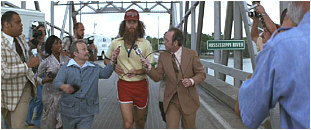 Now we move on the DVD Two, where a large variety of additional extras await us. First we discover Through the Eyes of Forrest Gump, a 1994 documentary about the making of the film. It seems to exist for promotional purposes, as it does its best to interest us in the movie. However, one shouldn’t mistake it for a glossy puff piece, for “Eyes” adds a lot of good information about the film. During this 30-minute program, we hear from all of the principal participants as they discuss a variety of aspects related to the movie. The program combines the usual mix of film clips, cast and crew interviews, and shots from the set.
Now we move on the DVD Two, where a large variety of additional extras await us. First we discover Through the Eyes of Forrest Gump, a 1994 documentary about the making of the film. It seems to exist for promotional purposes, as it does its best to interest us in the movie. However, one shouldn’t mistake it for a glossy puff piece, for “Eyes” adds a lot of good information about the film. During this 30-minute program, we hear from all of the principal participants as they discuss a variety of aspects related to the movie. The program combines the usual mix of film clips, cast and crew interviews, and shots from the set.
The latter two elements make this a fun piece. Hanks is consistently bright and funny in his interview segments, and he also lends a light and breezy air to the behind the scenes footage. It is a little disconcerting to see him looking like Gump but acting out of character, though. In any case, the program provides a basic but engaging look at the movie’s evolution and many aspects of its creation, from casting to character development to effects.
Under the heading of Production Featurettes, a wealth of goodies awaits. In the “Screen Tests” area, we discover auditions for a number of cast members. There are trials for Michael Conner Humphrey and Hanna R. Hall - both shot together - plus Robin Wright and Haley Joel Osment. The first section includes three screen tests, while each of the others offer two auditions. Each of these runs between 35 seconds and 125 seconds for a total of eight minutes and 50 seconds worth of footage.
While all of them were interesting, the Wright and Osment clips offered the most fun since they featured Tom Hanks as well. He clearly hadn’t finalized the character yet, as he seemed much more like “Tom Hanks” than “Forrest Gump”. The second test with Osment was particularly entertaining, as it really wasn’t a performance. Instead, Hanks simply chatted with Osment, and it was a cute and charming little piece.
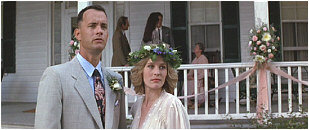 Next up is “Building the World of Gump”, a program that focuses on production design. The show offers interview snippets from production designer Rick Carter as he discusses the work he did on Gump, and it also provides some glimpses of the planning created along the way. The seven minute and 15 second program wasn’t fascinating, but it gave us a decent look at this aspect of the film.
Next up is “Building the World of Gump”, a program that focuses on production design. The show offers interview snippets from production designer Rick Carter as he discusses the work he did on Gump, and it also provides some glimpses of the planning created along the way. The seven minute and 15 second program wasn’t fascinating, but it gave us a decent look at this aspect of the film.
Within “Seeing Is Believing: The Visual Effects of Forrest Gump”, we get 11 smaller segments. In these we learn a little more about how the movie’s visual elements were created. Each snippet includes footage from the set and demonstrations of how the work was done, and we also always hear from visual effects supervisor Ken Ralston; in addition, computer graphics supervisor George Murphy turns up for segments 1, 5, 7, and 11, while CG supervisor Stephen Rosenbaum appears during parts 6, 8, and 10. Each clip lasts between 85 seconds and seven minutes, 35 second for a total of 38 minutes and 40 seconds of footage.
Although the material could become redundant at times, I generally enjoyed the information. Ralston helped break down the elements so that they made sense on their own, and it was interesting to see the different stages through which the footage needed to go. Especially useful were segments three and six, as they offered scenes left out of the final film. They were left in a fairly raw state, but it was still fun to see them, especially since the DVD lacked any true deleted scenes elsewhere.
“Through the Ears of Forrest Gump” works in a format similar to that of the prior section. Here we get five subsections that looked at the audio of the film. These consist of interviews with sound designer Randy Thom and snippets from the movie. Each of the five segments lasts between 80 seconds and seven minutes, 55 seconds for a total of 15 minutes and 20 seconds of material.
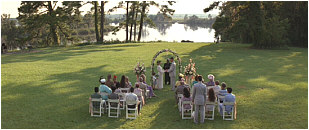 Thom offers good remarks about his work, which will come as no surprise to anyone who heard his part of the Cast Away audio commentary. The biggest segment of these five is the third one, which discusses the Vietnam scenes. For those who don’t know much about sound design, that section provides a nice tutorial, as Thom covers a lot of basics during it. Overall, these featurettes were reasonably interesting and informative.
Thom offers good remarks about his work, which will come as no surprise to anyone who heard his part of the Cast Away audio commentary. The biggest segment of these five is the third one, which discusses the Vietnam scenes. For those who don’t know much about sound design, that section provides a nice tutorial, as Thom covers a lot of basics during it. Overall, these featurettes were reasonably interesting and informative.
Called “The Magic Of Makeup”, the final section of the “Production Featurettes” goes over exactly what the title implies. The eight-minute program consists of interviews with makeup artist Dan Striepeke plus movie images and test material. I thought this was a surprisingly compelling program because it went over issues I rarely hear discussed. In addition to the expected topics such as Sally Field’s old-age look, Striepeke talked about the subtle ways that the maturation of Forrest and Jenny were conveyed. We also got to see some makeup tests that involved the cast members. This documentary provided a nice little look at this area.
Lastly, we find a few minor pieces. We get two trailers for the film; one was the original clip, while the other - referred to as “Remember” - clearly tried to tempt a return audience. We also discover a Photo Gallery that consists of 29 stills. These mix the usual movie images with some shots from the set, and they’re a decent but unspectacular array.
However, the “Photo Gallery” reminds me that I need to comment on one very positive aspect of the Gump DVD. Paramount have started to create some of the better-executed DVDs in regard to small areas. For one, Gump - along with other Paramount releases such as Mission: Impossible 2 - includes both English and French subtitles for almost all of the supplements; only the trailers lacked this information. This shouldn’t be a special feature; it should be a given, and I’m happy to see that Paramount often does it.
 Also, the “Photo Gallery” took advantage of the biggest possible images. Many DVDs - particularly those from Columbia-Tristar, such as The Blue Lagoon and Ghostbusters - refuse to present the stills in such a way that they take up most of the screen; various gimmicks occupy space that would be better served for photographic display. That wasn’t the case for Gump; all of its pictures fill as much room as possible, and many cover the entire 4X3 TV screen! That may not sound like a big deal, but the images really present a stronger impact when they’re that large; it makes the gallery a much more compelling affair.
Also, the “Photo Gallery” took advantage of the biggest possible images. Many DVDs - particularly those from Columbia-Tristar, such as The Blue Lagoon and Ghostbusters - refuse to present the stills in such a way that they take up most of the screen; various gimmicks occupy space that would be better served for photographic display. That wasn’t the case for Gump; all of its pictures fill as much room as possible, and many cover the entire 4X3 TV screen! That may not sound like a big deal, but the images really present a stronger impact when they’re that large; it makes the gallery a much more compelling affair.
Although I continue to harbor some reservations about Forrest Gump, I admit that most of these revolve around the film’s profile, not the work itself. On its own, Gump offers a reasonably entertaining and winning experience. It didn’t deserve all of the success it earned, but I can’t hold the reactions of others against it. The DVD provides generally very positive picture and sound, and it tosses in a very nice selection of extras. Forrest Gump is a strong DVD that should greatly please its legions of fans.